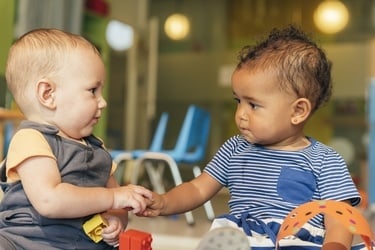When you first bring your newborn home, your concerns center largely around factors such as sleep and feeding schedules. Gradually, as your child grows, those concerns shift to basic motor skills, potty training, healthy eating, and eventually to social skills. As your child gets older and begins to interact more with others, you may begin to wonder about the appropriate social skills that they should possess at a given age. Perhaps you feel as though some of their peers or more advanced, and you’re concerned about whether or not your own child is on pace. Or, maybe you just want to make sure you have all the information necessary to spot a problem early. In any case, the following will help you know for sure if your little one is where they should be.
One-Year-Old Social Skills
At the age of one, your child is still getting the majority of their social learning from you. They may interact with you by handing you toys and attempt to communicate by pointing and vocalizing. You will also notice that your child is beginning to become more familiar with those they see regularly and may react with a smile upon seeing them. These are all positive signs that your child is developing socially and should be encouraged. For instance, when they hand you a toy or point to objects, engage with them by assigning the object a name or pointing out other items you see.
Two-Year-Old Social Skills
At two, a child’s social interaction is still largely based on interaction with their parents. However, they may begin to wave or smile more at others and will soon begin to engage in parallel play around this time. In this form of play, children play alongside their peers more so than with them. You may also notice that your child begins to label things as “mine” and has an unwillingness to share. This is common at this age when children remain largely egocentric. It is important to understand that their reactions are natural. However, you should also to continue to model sharing and other types of behavior you would like to see.
Three-Year-Old Social Skills
Big changes occur around the three year mark in regards to social interaction. You’ll notice that your child is now not only playing next to other children, but that they are beginning to actively play with them as well. However, it is important to note that kids at this age do not yet have all of the social rules down pat and their actions will often reflect this in forms such as hitting or biting. In these moments, parents can take the opportunity to guide their child to a more appropriate form of action and explain why such behavior is not okay. At this time, they are becoming far more aware of the emotions of others and how their actions may result in a negative or positive response, making parental guidance key.
Four-Year-Old Social Skills
By the age of four, children are interacting far more with their peers and are learning to cooperate with others. While there will certainly still be fights over issues such as sharing, children now have a far better understanding of the concept. You may also notice at this time that your child is more affectionate toward you and other loved ones, and they may show concern when they realize that you are hurt or sad. They will also begin to exert their independence wherever they can. They may want to dress themselves, help around the house, or go to the restroom on their own. While they certainly cannot do everything they would like, allowing your child to exercise a bit of independence in action or choice is a good thing.
If you want to ensure that your child is hitting all of the appropriate milestones, including social development, speak with your pediatrician. He or she can let you know what is or is not typical for their age, as well as offer guidance to help them achieve the social skills they will need now and into the future.
Learn more about Lane Pediatrics, and Dr. Jacob LeBas or request an appointment by clicking the link below.
6110 Main Street, Suite B
Zachary, LA 70791
(225) 658-4070




